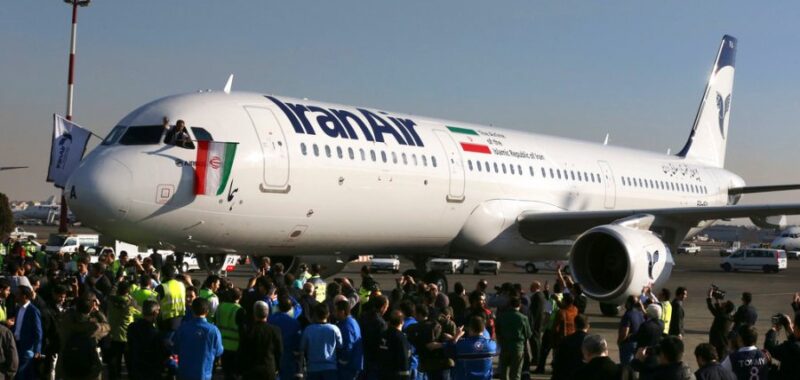
Following the revelation that the Islamic Republic of Iran had transferred hundreds of ballistic missiles to Russia, Secretary of State Antony Blinken announced new U.S. sanctions on Iran Air, the regime’s flag carrier.
In line with a warning issued by the G-7 in April, the transfer also prompted France, Germany and the United Kingdom to cancel bilateral air service agreements with Iran, effectively banning Iran Air from flying to western Europe.
Though this move has been met with immediate criticism, with some stating that the move “has no impact,” the European countries made the correct decision. The banning and sanctioning of Iran Air follows a clear precedent and is necessary to constrain the Islamic Revolutionary Guard Corps (IRGC), given the airline’s inextricable ties to that paramilitary group.
Iran Air cannot be treated as a conventional flag carrier, as its corporate structure, staff and logistical networks are all dominated by the IRGC. Iran maintains direct ownership and appoints the airline’s leadership, which is primarily composed of IRGC commanders. This includes the chief executive officer of Iran Air, Shamseddin Farzadipour.
Prior to his appointment to the position in 2022, Farzadipour served as a general in the Islamic Revolutionary Guard Corps Air Operations Command. Notably, he held this post at the time the IRGC shot down Ukraine International Airlines Flight 752, killing 176 civilians. Canada, the United Kingdom, Ukraine and Sweden are currently seeking international settlement proceedings for this illegal act.
Beyond executive management, the IRGC is integrated into Iran Air’s entire infrastructure. For instance, the paramilitary is charged with maintaining the airline’s primary hub, Tehran’s Imam Khomeini Airport. The airport’s ongoing redevelopment is entirely managed by the IRGC’s chief economic arm, Khatam al-Anbiya Construction Headquarters.
The IRGC plays a similar role in managing Iran Air’s secondary hubs, including the Chahbahar and Mehrabad airports, holds jurisdiction over the airline’s security, and utilizes terminals for its own use.
The impact of IRGC control is clear. Though ordinary Iranians may fly on Iran Air, the airline has also become integral to the paramilitary’s operational logistics. Since 2012, the IRGC has used ostensibly civilian Iran Air flights to transfer arms and personnel to the Assad regime, which is subject to international sanctions for human rights abuses. This support in cooperation with Russia has proven critical in propping up the regime amid Syria’s ongoing civil war.
Perhaps most concerning is the IRGC’s persistent use of Iran Air flights to ferry munitions, suicide drones and personnel to Russia — which is reflected in recent U.S. sanctions designations. Russia’s warfighting capability in Ukraine would be greatly diminished if not for arms transported from Iran, which Iran Air has facilitated.
This is also not the first time Iran Air has come under international scrutiny. United Nations Security Council resolutions in 2008 and 2010 called for member states to inspect the airline’s cargo, due to its suspected involvement in violating anti-proliferation statutes. There is little clarity on whether this practice has continued.
Given the airline’s clear involvement in meeting the IRGC’s strategic objectives, its frequent flights to and from European airports posed a significant security risk. Banning Iran Air prevents the IRGC from operationalizing the airline for transit and access to critical infrastructure in western Europe.
In addition to restricting Iran Air’s access to airspace and airports, the French, German and British Foreign Ministers claim to be working towards the imposition of sanctions. This too is the correct course of action, and is necessary to put pressure on the airline’s operations. United States sanctions have already limited the airline’s range, and grounded many of its aircraft. Similarly, sanctions imposed against Russian airlines by the United Kingdom and European Union on the basis of security risks and involvement in the invasion of Ukraine have proven effective.
The Russian airline industry is locked in decline, with some carriers even cannibalizing aircraft to continue operating. Implementing similar sanctions against Iran Air stand to enhance European support for Ukraine on the issues of weapons and personnel transfers from Iran to Russia.
This is also not the first time western states have imposed restrictions and sanctions against airlines controlled by the Islamic Republic. Since 2009, European states including Germany, Italy and Spain have banned Iran’s Mahan Air for its involvement in IRGC operations.
The UK issued its own suspension over the airline’s failure to meet international safety standards. As mentioned, the United States has already banned Iran Air on the basis of its IRGC ties for over a decade, with additional sanctions instituted in recent years. All these actions are both warranted and acceptable under international statutes governing aviation restrictions – and follow an earlier warning issued by the G-7 in April.
Ultimately, these actions by the France, Germany and the UK targeting Iran Air are not without effect. The airline’s deep entanglement with the IRGC poses a clear threat to international security. Moreover, suspending Iran Air’s flights to France, Germany and the United Kingdom and imposing sanctions will disrupt the IRGC’s logistical network. Furthermore, it is likely that additional action will be taken in the near future.
Even after these measures are implemented, Iran Air will still continue its flights to Italy and Austria, and the airline is not yet subject to European Union sanctions. As the Islamic Republic continues to engage in malign activities throughout Europe, it is time for other nations to follow suit and counter the airline that facilitates IRGC operations.
Jack Roush is a research associate at United Against Nuclear Iran.

